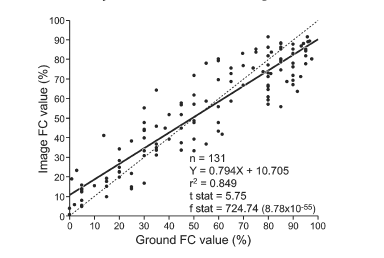« Car bombs and credibility | Main | Interdiction is up in Bolivia »
September 11, 2006
Fumigation and "defoliation"
The International Journal of Remote Sensing is a periodical that you'll rarely find on our reading list. But we were very interested to read a paper recently published there about "Defoliation and the war on drugs in Putumayo, Colombia." An abstract of the paper is available here, but unfortunately you have to pay to read the whole thing.
Much of the paper looks like this:

Or like this:

But the authors' conclusion is easy enough to understand:
[A]erial spraying of defoliants under the US ‘Plan Colombia’ programme impacted broad swaths of the landscape and had the unintended consequence of defoliating contiguous and interspersed native plant and food crop parcels. ... The complex spatial organization of the Colombian coca-producing landscape appeared to confound the spraying of defoliants, and as demonstrated here, many non-coca land cover classes have been affected adversely.
In other words, satellite imagery seems to vindicate all those Colombian campesinos claiming that the U.S.-funded herbicide fumigation, through inaccuracies and spray drift, destroys legal crops, alternative-development projects, and nearby forest.
This finding seems to contradict the State Department's regular certifications to the U.S. Congress that such environmental damage is not happening. The last certification, for instance, reads as follows:
The Government of Colombia regularly conducts studies to assess the spray program's environmental impact through ground truth verifications to estimate spray drift and the accuracy of the spray mixture application and during verification of all legitimate complaints about alleged spraying of crops or vegetation that are not coca or opium poppy. After one recent verification, the Government of Colombia’s Ministry of Environment, Housing, and Territorial Development characterized spray drift in the following fashion:
The drift effects that were observed in areas visited on a random basis were temporary in nature and small in extent, and basically consisted of partial defoliation of the canopy of very high trees. No complementary collateral damage from spraying activities was observed at the sites selected and verified. In sprayed areas that were subsequently abandoned, it was noted that vegetation was starting to grow again, the predominant types being grasses and a number of herbaceous species (Attachment 2, p. 4)
The Department of State believes that the program’s rigid controls and operational guidelines have decreased the likelihood of adverse impacts of the eradication program on humans and the environment and that the herbicide mixture, in the manner it is being used, does not pose unreasonable risks or adverse effects to humans or the environment.
The International Journal of Remote Sensing paper charges that the problem is far more widespread than the U.S. and Colombian governments maintain, and that the environmental impact may indeed be quite serious.
The region is classic humid tropics, with cloud cover present almost every day. This has made both monitoring the situation more difficult and, conversely, hiding the effects from the public simpler. While this research should not be used to indict the UNODC or the organizations responsible for spraying, it should serve as a warning that the published reports on drug war results are open to interpretation and that some of the anecdotal, and usually dismissed, claims of misapplication of spraying may, in fact, be true.
Add to this the widespread anger and resentment in areas where development aid has failed to keep up with the spray planes. Yet even with all this collateral damage, the ends can't even be said to justify the means. The hugely expensive fumigation program has still failed to reduce coca-growing in Colombia.
Posted by isacson at September 11, 2006 3:20 PM
Comments
I've never doubted that such damage occurs, but seeing a scientific analysis of the situation is quite fortunate and provides valuable information.
Posted by: jcg ![[TypeKey Profile Page]](http://www.ciponline.org/colombia/blog/nav-commenters.gif) at September 11, 2006 5:45 PM
at September 11, 2006 5:45 PM
Tsk,tsk. It hardly matters whether fumigation in Colombia effectively destroys coca or whether collateral damage is done to legitimate farms and tropical forest.
The important thing is to make various U.S. politicians and their constituents FEEL LIKE something worthwhile is being done.
Reality is--well, what you WANT it to be. (Of course, this particulary fantasy is a little expensive.)
Posted by: richtiger ![[TypeKey Profile Page]](http://www.ciponline.org/colombia/blog/nav-commenters.gif) at September 11, 2006 7:45 PM
at September 11, 2006 7:45 PM
Post a comment
Thanks for signing in, . Now you can comment. (sign out)
(If you haven't left a comment here before, you may need to be approved by the site owner before your comment will appear. Until then, it won't appear on the entry. Thanks for waiting.)